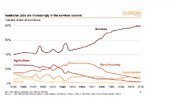Value Collector
Have courage, and be kind.
- Joined
- 13 January 2014
- Posts
- 12,237
- Reactions
- 8,483
The more the world relies on trade with each other the more national security we all have, there is a reason Europe was constantly at war when they were all mercantilist.You are looking at things from a purely capitalistic viewpoint.
There are other considerations like national security, supply line security and self reliance which actually have a value in an increasingly uncertain world.
We could reduce our economy to us all just being subsistence farmers, and live like a third world country and feel happy that we don’t import anything, but that would be pretty silly.
I would much rather divert capital to truly profitable export industries and use the profits to buy all the stuff we couldn’t be profitable in, and provide jobs that are better than sweat shops.
Last edited:




